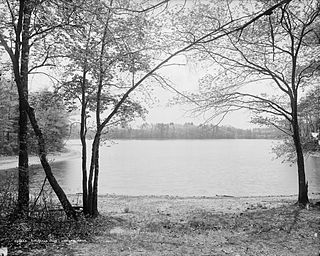 W
WHenry David Thoreau was an American naturalist, essayist, poet, and philosopher. A leading transcendentalist, he is best known for his book Walden, a reflection upon simple living in natural surroundings, and his essay "Civil Disobedience", an argument for disobedience to an unjust state.
 W
WThe Estabrook Woods is a wild tract of more than 1,200 acres (4.9 km2) of woodland, hills, ledge, and swamp two miles (3 km) north of the Town of Concord. It is the largest contiguous and undeveloped woodland within thirty miles of Boston. However, the woods have a history of human disturbance dating back to the Algonquian Native Americans who used controlled burning to clear tracts of land. Later, colonists cleared much of Estabrook for agriculture and pastures, although vegetation has since rejuvenated. The Woods are named for the Estabrook family, prominent in the area since colonial times. The first Estabrook in the area, Capt. Joseph, purchased his farm, now part of Estabrook Woods, from the Pelham family, then of Rhode Island.
 W
WFairhaven Bay is a lake located within the Sudbury river in Concord, Massachusetts, United States (US). It was frequented by Henry David Thoreau who, together with Edward Hoar, accidentally set fire to the woods near the bay in April 1844, as later described in Thoreau's journal.
 W
WFairyland Pond is a pond within Hapgood Wright Town Forest, a conservation area in Concord, Massachusetts. It is a popular recreation area, notable for its old-growth forest and its association with many literary figures from Concord’s past.
 W
WHenry Hikes to Fitchburg is the first book of a series of five picture books by D.B. Johnson based on Henry David Thoreau. Every Henry book has an author's note saying which passage by Thoreau inspired this particular book.
 W
WThe Night Thoreau Spent in Jail is a two-act American play by Robert E. Lee and Jerome Lawrence written in 1969. The play is based on the early life of the title character, Henry David Thoreau, leading up to his night spent in a jail in Concord, Massachusetts. Thoreau was jailed for refusing to pay a poll tax on the grounds that the money might be used to pay for the Mexican–American War, which he opposed.
 W
WFounded in 1941, the Thoreau Society is the oldest and largest organization dedicated to an American author. It is based in Concord, Massachusetts, United States, at the house where Henry David Thoreau was born in 1817. With members from all 50 states and countries around the world, the Society disseminates knowledge about Thoreau by collecting books, manuscripts, and artifacts relating to Thoreau and his contemporaries, by encouraging the use of its extensive collections, and by publishing two periodicals, the Thoreau Society Bulletin and the Concord Saunterer.
 W
WThe Thoreau–Alcott House is a historic house at 255 Main Street in Concord, Massachusetts, United States that was home to the writers Henry David Thoreau and Louisa May Alcott at different times.
 W
WSophia Elizabeth Thoreau (1819–1876) was an American editor. As the sister of Henry David Thoreau and his close collaborator, she was responsible for the posthumous publication of many of his well-known works.
 W
WWalden Pond is a pond in Concord, Massachusetts, in the United States. A famous example of a kettle hole, it was formed by retreating glaciers 10,000–12,000 years ago. The pond is protected as part of Walden Pond State Reservation, a 335-acre (136 ha) state park and recreation site managed by the Massachusetts Department of Conservation and Recreation. The reservation was designated a National Historic Landmark in 1962 for its association with the writer Henry David Thoreau (1817–1862), whose two years living in a cabin on its shore provided the foundation for his famous 1854 work, Walden; or, Life in the Woods. The National Historic Preservation Act of 1966 ensured federal support for the preservation of the pond.
 W
WThe Wheeler-Minot Farmhouse, also known as the Thoreau Farm or the Henry David Thoreau Birthplace, is a historic house at 341 Virginia Road in Concord, Massachusetts, United States. It is significant as the birthplace of writer Henry David Thoreau. The house was listed on the National Register of Historic Places in 2004. It currently serves as a museum and is open to the public.